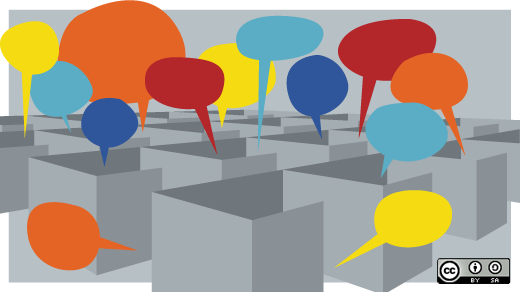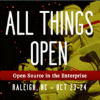The Eclipse Foundation supports a vibrant an open source community. Those who work on their projects are focused on building an open development platform comprised of extensible frameworks, tools, and runtimes for building, deploying, and managing software across the lifecycle.
Started in 2004, the Eclipse Foundation has an interesting history (read more about it here), beginning with The Eclipse Project at IBM in 2001.
Currently, Mike Milinkovich is the Executive Director at the Eclipse Foundation, and I caught a moment of his time for a few questions. His talk at the All Things Open conference this week will be about how foundations can stay relevant along with their open source communities. Get to know Mike and the Eclipse community better in this interview.

Tell us a bit about yourself and your background.
I've basically done every job you can do in a software or technology company from accountant to software developer to business development executive. As a result, I think that one of my strengths is that I can talk to just about anyone in our industry and have at least some basic empathy with where they're coming from.
As a developer, my first love was APL (which was a truly strange and wonderful language), but my true love was Smalltalk. But I've hacked in over a dozen different programming languages at one time or another. I wrote my Masters thesis in the 1980s in Objective-C, and you cannot imagine how surprised I am to see the resurgence of that language. The product that I worked on that that at least a few folks may remember is OTI's ENVY/Developer, which later became the basis for IBM's VisualAge for Java. I've worked in large multi-nationals such as Nortel, IBM, and Oracle. I've worked in three startups as well. I've managed to have an interesting and varied career while living in the city I grew up and studied in, which is Ottawa, Canada.
In addition to my day job as the Executive Director of the Eclipse Foundation, I am a Director of the Open Source Initiative, a member of the Java Community Process' Executive Committee, and a past director and observer on the board of the OpenJDK community.
You have had quite an interesting career path. Tell us how you evolved from working on proprietary software to open source.
My first real exposure to open source was in my current job at Eclipse. My passion is seeing open source principles be applied to solve really tough business, organizational, and technical problems. I firmly believe that open wins, and I love seeing how far the open source movement has progressed over the past decade.
When I was recruited for the job at the Eclipse Foundation I was a VP at Oracle, which is not necessarily the most obvious place to launch an open source career. But as IBM, Intel, HP, and SAP were working together to launch the Eclipse Foundation in 2004, I think I sort of pattern matched my way into the job. I had been employee number 12 at OTI (Object Technology International), which at the time was an IBM subsidiary and the core team that built Eclipse. I had left IBM/OTI five years previously, but still had cordial relationships with quite a few of the project leaders within the Eclipse community. I had built IDEs before and had a pretty decent grasp of the technology. I also had a solid business background and had the basic skills required to create a small business, which the Eclipse Foundation is.
Originally I was mostly excited about how open source best practices can be used to spur open innovation amongst companies. But, I have to admit that over time the fun and excitement of being involved in an open community has become more important to me. I really love my job acting as the Eclipse community's chief cheerleader.
What excites you about open source? Where do you see it going?
Open wins. We have seen this time and time again. Open source has been critical to the business models of many of the world's most successful start-ups over the past decade. I'm thinking of companies like Google, Facebook, and Twitter. Linux, in particular, is driving the world of devices that is literally growing around us everyday. Open source software runs the infrastructure of our largest enterprises, is driving the emergence of the cloud, and is enabling the next generation of start-ups. In short, it is changing the world.
But, I still see a ton of opportunities for open source to become even more important. One area that has always intrigued me is in the area of enterprise applications. No matter which industry or domain you can think of, there are a set of basic business processes, standards, and protocols that every company in it has to implement.
In today's world that basic infrastructure is either built in-house or is provided by commercial software vendors which charge a lot of money for solving problems which at their core are just not that tough. I've long believed that enterprises could band together and use open source approaches to build common, industry-specific infrastructure at a fraction of the current cost. Even beyond the cost, I just think it is an utter waste of human talent and energy to have very similar software stacks being replicated across multiple enterprises. Far too much software gets written which really has zero differentiating value for the organization funding its development, and I think that shared, community-based development would be a radically more efficient way to get this done.
What is unique about the Eclipse community?
Every human institution evolves a specific culture based on its history and accomplishments. The Eclipse Foundation is unique in that it is a marriage of an open, transparent, and meritocratic open source community with an industry consortium who wants to create a commercially profitable ecosystem. This dual nature of Eclipse goes back to its creation by IBM in 2001 when they announced both an open source project contribution and a consortium. At the time, this was an incredibly novel idea. Now we all consider it obvious.
The measure of success for Eclipse projects is largely around adoption. In particular, we love projects that succeed as a platform such as the Eclipse tooling platform, our modeling platforms, and the Rich Client Platform. I think that this focus on being a platform, and the values around quality, API stability, and regular, predictable release schedules are really quite unique. Our annual simultaneous releases have been on time to the day for nine years straight, which is an incredible testament to what a community can accomplish. Very few software organizations of any type can equal that track record.
What are the challenges the Eclipse Foundation faces going forward? Anything exciting on the horizon that you can share with us?
Our number one challenge today is to reinvigorate the level of investment and innovation going into our Java development tools. I think that we must do better there as a community than we have over the last couple of years.
Another challenge is to do a better job of getting the message out that the Eclipse Foundation is language and platform agnostic. A lot of people still think of Eclipse as the place that only builds open source tools in Java. In fact, we will support projects in any language, and have some very cool projects in languages like C, JavaScript, and Lua. But obviously it takes some serious time and effort to change people's perceptions.
In terms of exciting new areas, the ones which really stand out in my mind are things like Vert.x which is a JVM-based polyglot application platform, and Orion which is a browser-based tooling platform focused on JavaScript, HTML, and CSS. We are also rapidly building quite a community interested in location-based technologies with projects like uDig and GeoMesa. But the one that I am personally most excited by is the community we have starting in the area of Internet of Things and Machine-to-Machine. This is a technology area that I dabble in as a hobbyist (I own four Raspberry Pis, two Arduinos, and a BeagleBone Black), and I love to see the momentum that the Eclipse community is gaining in this area.
Just to mention one cool new project, the core of the openHAB project is moving to Eclipse as the Eclipse Smart Home project. It provides a nice platform and toolset for integrating home automation devices from multiple vendors and protocols into a single solution for a homeowner. The project just won a Duke Award at JavaOne a few weeks ago.
Can you give us a sneak preview as to what you will cover in your All Things Open talk (without giving too much away)?
The technology industry and the developer community never stops changing, and my talk is focused on how open source foundations need to change to stay relevant. I believe very deeply that open and meritocratic communities which treasure their independence and vendor neutrality have an important role to play in the future of both our industry and our society. But no organization which is unwilling or unable to adapt to their changing environment will survive longterm. Of course, I will be drawing many of my examples from Eclipse, because that's the organization I know best.
Read more from the All Things Open speaker interview series.







Comments are closed.